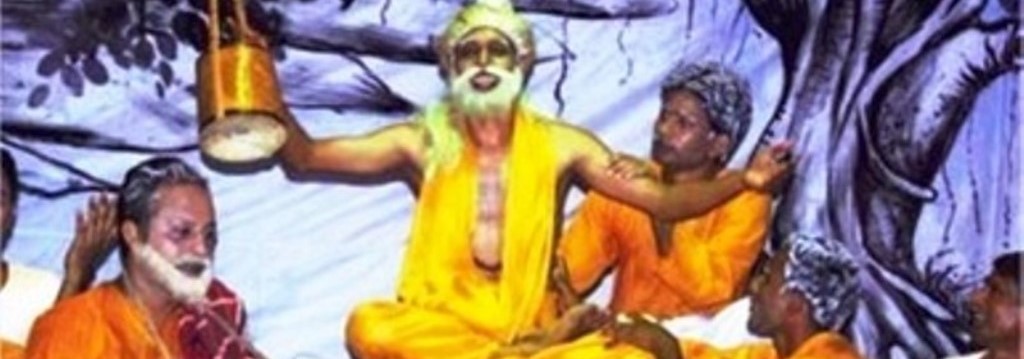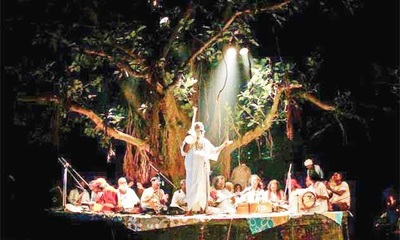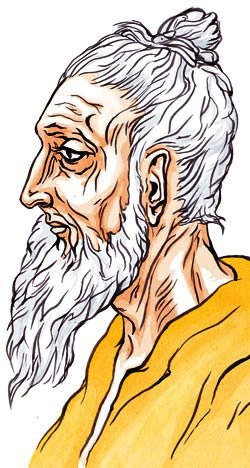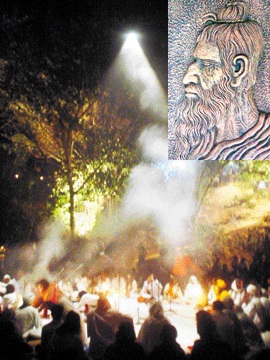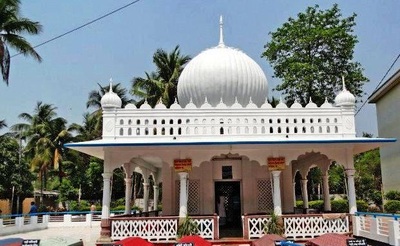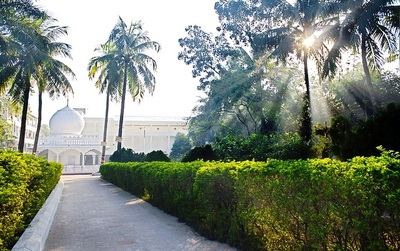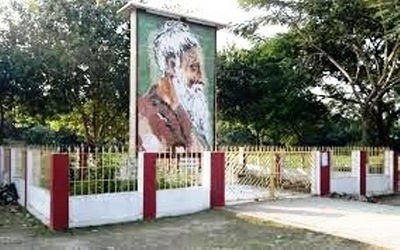Probably Lalon was born in 1774 formerly Nadia district now known as kushtia, Bangladesh. As his life is controversial, it is difficult to find the real history of his life. Lalon never revealed his social identity because of his consistent opposition against all forms of communal identity. He tried to hide his identity. When people asked him whether he is Hindu or Muslim he said he himself even does not know who he is. It is found that he composed about 10,000 songs of which only 2000 to 3000 thousands can be tracked. Rabindranath Tagore was influenced by Lalon’s music. Some researchers say that if Lalon was educated he could be like Rabindranath. All his songs reflect the strong belief in humanity, mysticism, ascetics and divinity.
Life of Lalon
History of Lalon’s life is very much mysterious. Nobody can clearly tell about his caste, religion and ancestry. Lalon himself also did not disclose his identity. From the one source it has been found that Lalon was born in a noble hindu family in Kushtia( former Nadia). But another source says that he was born in a respectable Muslim family in Jhenidahe district in the same year. For the bad financial condition he could not continue his studies.
According to another source, Lalon with his companions went for a Pilgrimage or to have bath in Ganges. While he was coming home, he was attacked by the smallpox and fainted. The companions thought that he died so they kept fire on his mouth and left him beside the river. The companion told his mother that Lalon was died.
In that time some Muslim women went to river to collect water. One of the women called Motijan found Lalon in a very critical condition. She brought Lalon in her home and nursed him and Lalon become well. Then Lalon came back to his village, but the people of his village disagreed to accept him though his mother and sisters were happy to found him alive. The people of his village wanted to cast him out as he took food from the house of the Muslim and even his ritual was performed. Lalon was greatly hurt by these behaviors and left his village forever and decided to lead a worldly life.
History of Lalon’s life is very much mysterious. Nobody can clearly tell about his caste, religion and ancestry. Lalon himself also did not disclose his identity. From the one source it has been found that Lalon was born in a noble hindu family in Kushtia( former Nadia). But another source says that he was born in a respectable Muslim family in Jhenidahe district in the same year. For the bad financial condition he could not continue his studies.
According to another source, Lalon with his companions went for a Pilgrimage or to have bath in Ganges. While he was coming home, he was attacked by the smallpox and fainted. The companions thought that he died so they kept fire on his mouth and left him beside the river. The companion told his mother that Lalon was died.
In that time some Muslim women went to river to collect water. One of the women called Motijan found Lalon in a very critical condition. She brought Lalon in her home and nursed him and Lalon become well. Then Lalon came back to his village, but the people of his village disagreed to accept him though his mother and sisters were happy to found him alive. The people of his village wanted to cast him out as he took food from the house of the Muslim and even his ritual was performed. Lalon was greatly hurt by these behaviors and left his village forever and decided to lead a worldly life.
Lalon met with a guru called Siraj Snai. After completing the first stage of the spirituality, he was advised to go to the bank of Kaliganga near to Kushtia. Lalon put an Akhra there in 1830. Local people helped him. Many people loved his idea and philosophy of life and become his follower. Lalon sung song and composed many songs. His songs reflect deep philosophical ideas. His songs classified into three categories like spiritual truth, body truth and self-truth. At the site of his shrine, a research centre was built about his philosophy in 1963. In his shrine both Muslim and Hindu pay tribute. His metaphysical thoughts are reflected by his songs. He died on 17 October, 1890 in Kushtia at the age of 116. Before his death he sung the last song.
“O, the kind, dear of mine,
Take me from here to thine
Pardon me for my sin
In this, worldly confinement”
“O, the kind, dear of mine,
Take me from here to thine
Pardon me for my sin
In this, worldly confinement”
For which qualities people consider Lalon as Philosopher?
People all over the world consider Lalon as a great philosopher. There are many people who think that Lalon has some great internal qualities by which he could serve the people. Actually Lalon wanted to remove pain form the mind of the people by his philosophy. In our everyday life people face many problems, so Lalon wanted to invent some rules by which he could pacify the mind of the common people. He considered every man equally. From the following we find that.
Everyone asks, "What Jāt does Lalon belong to in this world?" Lalon answers, "What does Jāt look like?"I've never laid eyes upon it.Some use Malas (Hindu rosaries), others Tasbis (Muslim rosaries), and so people say they belong to different Jāts. But do you bear the sign of your Jāt when you come (to this world) or when you leave (this world)?
Lalon hated religious conflict. In his many songs we find this. He was also against nationalism. He did not believe in class or cast system. He was against racism. Lalon’s philosophy does not neglect worldly life. He wanted to combine philosophy and worldly life. He believed in the power of music and he thought that musical power can alter the mind of human being.
The unknown Bird in the cage...
how does it fly in and out?
Catch it, I would, if I could...
and put my mind's chains on its feet.
There are eight rooms with nine doors,
with lattice-work in between.
On top of that, there’s a central yard
and a hall of mirrors.
— Lalon's song translated by James
Lalon’s songs reflect the metaphysical philosophy as well as the natural beauty, social reality and the facts of common people. There is another major influence of Lalon on Islam. He approached and appropriated Islam from his Nadiya perspective providing fascinating interpretation of prophets and prophet hood.
Lalon’s philosophical expression was based in songs and musical compositions using instruments that could be made by any available rural household materials: an ektara (one-string musical instrument) and a dugi(hand drum). Like the Bangal or Bangali (a hybrid nation bearing Australoid, Dravidian, Mongoloid, Aryan, Saka, Hun, Greek and Roman, Afghan, Arab, Turk, Persian, Dutch, French, English etc. genetic endowment), their language, literature, culture, tradition and civilization (a mixture of variety of elements) Lalon’s philosophy also bear the same hybrid heritage.
People all over the world consider Lalon as a great philosopher. There are many people who think that Lalon has some great internal qualities by which he could serve the people. Actually Lalon wanted to remove pain form the mind of the people by his philosophy. In our everyday life people face many problems, so Lalon wanted to invent some rules by which he could pacify the mind of the common people. He considered every man equally. From the following we find that.
Everyone asks, "What Jāt does Lalon belong to in this world?" Lalon answers, "What does Jāt look like?"I've never laid eyes upon it.Some use Malas (Hindu rosaries), others Tasbis (Muslim rosaries), and so people say they belong to different Jāts. But do you bear the sign of your Jāt when you come (to this world) or when you leave (this world)?
Lalon hated religious conflict. In his many songs we find this. He was also against nationalism. He did not believe in class or cast system. He was against racism. Lalon’s philosophy does not neglect worldly life. He wanted to combine philosophy and worldly life. He believed in the power of music and he thought that musical power can alter the mind of human being.
The unknown Bird in the cage...
how does it fly in and out?
Catch it, I would, if I could...
and put my mind's chains on its feet.
There are eight rooms with nine doors,
with lattice-work in between.
On top of that, there’s a central yard
and a hall of mirrors.
— Lalon's song translated by James
Lalon’s songs reflect the metaphysical philosophy as well as the natural beauty, social reality and the facts of common people. There is another major influence of Lalon on Islam. He approached and appropriated Islam from his Nadiya perspective providing fascinating interpretation of prophets and prophet hood.
Lalon’s philosophical expression was based in songs and musical compositions using instruments that could be made by any available rural household materials: an ektara (one-string musical instrument) and a dugi(hand drum). Like the Bangal or Bangali (a hybrid nation bearing Australoid, Dravidian, Mongoloid, Aryan, Saka, Hun, Greek and Roman, Afghan, Arab, Turk, Persian, Dutch, French, English etc. genetic endowment), their language, literature, culture, tradition and civilization (a mixture of variety of elements) Lalon’s philosophy also bear the same hybrid heritage.
The philosophy Lalon talked about seeking the Great Power within self. He thought about the refinement of human body and how people want to find God somewhere else. He believes, human body is the final place where God exists in. Fakir Lalon Shah’ji believed that if there is a greater power, people are a part of it.

